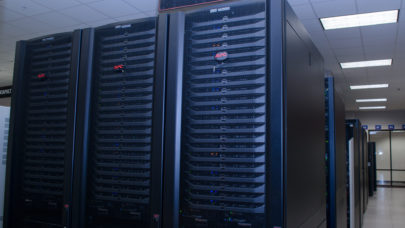
HPC User Forum: Sustainability at TACC Points to Software
October 3, 2023
Recently, Dan Stanzione, Executive Director, TACC and Associate Vice President for Research, UT-Austin, gave a presentation on HPC sustainability at the Fall 20 Read more…

Chameleon’s HPC Testbed Sharpens Its Edge, Presses ‘Replay’
July 22, 2021
“One way of saying what I do for a living is to say that I develop scientific instruments,” said Kate Keahey, a senior fellow at the University of Chicago a Read more…

NSF Awards $10M to Extend Chameleon Cloud Testbed Project
September 19, 2017
The National Science Foundation has awarded a second phase, $10 million grant to the Chameleon cloud computing testbed project led by University of Chicago with Read more…

Chameleon: Why Computer Scientists Need a Cloud of Their Own
May 5, 2016
Chameleon, the NSF-funded cloud testbed co-located at the University of Chicago and the Texas Advanced Computing Center, has been operating less than one year, Read more…

XSEDE Panel Highlights Diversity of NSF Computing Resources
July 31, 2015
A plenary panel at the XSEDE15 conference, which took place this week in St. Louis, Mo., highlighted the broad spectrum of computing resources provided by the N Read more…

NSF Rolls Out Innovative Cloud Testbeds
August 21, 2014
The National Science Foundation (NSF) announced funding for two cloud testbeds, named "Chameleon" and "CloudLab.” A total award of $20 million to be split eve Read more…

- Click Here for More Headlines

Whitepaper
How Direct Liquid Cooling Improves Data Center Energy Efficiency
Data centers are experiencing increasing power consumption, space constraints and cooling demands due to the unprecedented computing power required by today’s chips and servers. HVAC cooling systems consume approximately 40% of a data center’s electricity. These systems traditionally use air conditioning, air handling and fans to cool the data center facility and IT equipment, ultimately resulting in high energy consumption and high carbon emissions. Data centers are moving to direct liquid cooled (DLC) systems to improve cooling efficiency thus lowering their PUE, operating expenses (OPEX) and carbon footprint.
This paper describes how CoolIT Systems (CoolIT) meets the need for improved energy efficiency in data centers and includes case studies that show how CoolIT’s DLC solutions improve energy efficiency, increase rack density, lower OPEX, and enable sustainability programs. CoolIT is the global market and innovation leader in scalable DLC solutions for the world’s most demanding computing environments. CoolIT’s end-to-end solutions meet the rising demand in cooling and the rising demand for energy efficiency.
Download Now
Sponsored by CoolIT
Whitepaper
Transforming Industrial and Automotive Manufacturing
Divergent Technologies developed a digital production system that can revolutionize automotive and industrial scale manufacturing. Divergent uses new manufacturing solutions and their Divergent Adaptive Production System (DAPS™) software to make vehicle manufacturing more efficient, less costly and decrease manufacturing waste by replacing existing design and production processes.
Divergent initially used on-premises workstations to run HPC simulations but faced challenges because their workstations could not achieve fast enough simulation times. Divergent also needed to free staff from managing the HPC system, CAE integration and IT update tasks.
Download Now
Sponsored by TotalCAE
Advanced Scale Career Development & Workforce Enhancement Center
Featured Advanced Scale Jobs:
HPCwire Resource Library
HPCwire Product Showcase
© 2024 HPCwire. All Rights Reserved. A Tabor Communications Publication
HPCwire is a registered trademark of Tabor Communications, Inc. Use of this site is governed by our Terms of Use and Privacy Policy.
Reproduction in whole or in part in any form or medium without express written permission of Tabor Communications, Inc. is prohibited.
























